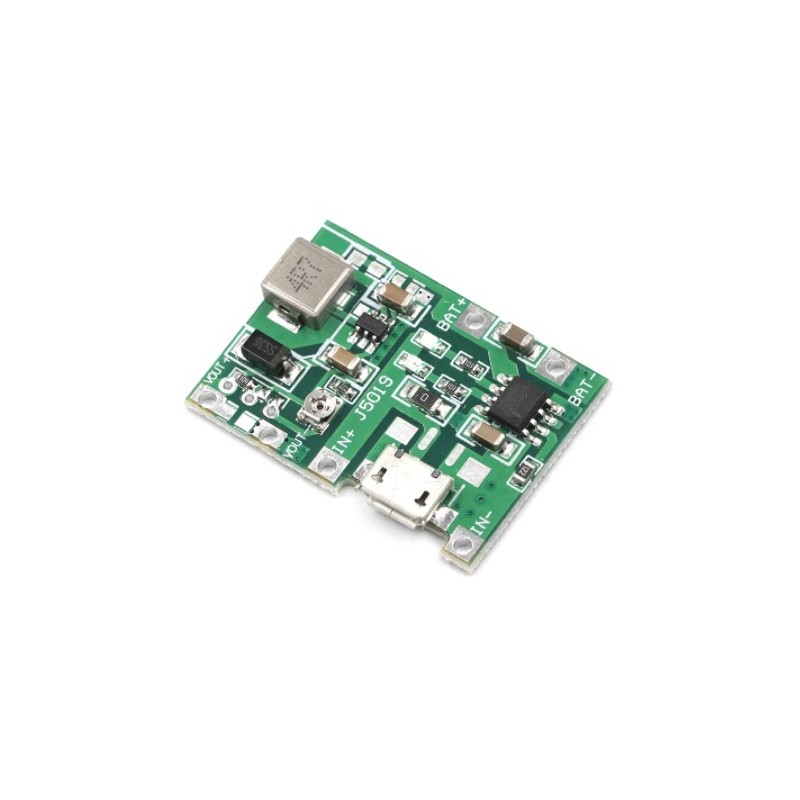




Charger module for Li-Ion batteries based on the TP4056 system with built-in Step Up converter. The charger can supply a current of up to 1 A and discharge the battery with a current of up to 2 A. The input voltage of the module ranges from 4.5 to 8 V, while the output voltage is dynamically regulated and ranges from 4.3 V to 27 V. The module is powered by the microUSB connector or by the IN + and IN- pins. It can work with solar panels.
The TP4056 is a complete constant current / constant voltage linear charger for lithium-ion batteries. The device includes a built-in power MOSFET. The built-in 8-bit ADC can automatically regulate the charging current. TP4056 is specially designed to operate within USB power specification.
Manufacturer BTC Korporacja sp. z o. o. Lwowska 5 05-120 Legionowo Poland sprzedaz@kamami.pl 22 767 36 20
Responsible person BTC Korporacja sp. z o. o. Lwowska 5 05-120 Legionowo Poland sprzedaz@kamami.pl 22 767 36 20
Pin header goldpin black 1x40 pins. Straight connector for through-hole assembly. 2.54mm pitch.
Cables for evaluation boards, set of 10 pcs., blue colour
No product available!
A set of 10 female-female connection cables, in various colors, 17 cm long. CAB_F-F (Rainbow-10-17)
18650 Li-Ion battery with a nominal voltage of 3.7V and a capacity of 3000mAh. Sony US18650VTC6
Li-Ion 18650 battery with a nominal voltage of 3.7V and a capacity of 2600mAh. It has protection against overcharging, excessive discharge, overload and short circuit.
Li-Ion 18650 battery with a nominal voltage of 3.6V and a capacity of 3500mAh. It has protection against overcharging, excessive discharge, overload and short circuit.
No product available!
The Li-Ion battery charger module is designed to work with solar panels. The charger can supply a current of up to 500 mA. The module input voltage is in the range of 4.4 to 6 V.
No product available!
LiPo 3.7 V battery charger module with USB Type-C socket. DFRobot DFR0668
No product available!
LiPo 3.7 V battery charger module with a microUSB socket. DFRobot DFR0667
Charger module for Li-Ion batteries based on the TP4056 system. It can supply current up to 1 A. The input voltage of the module ranges from 4.5 to 8 V. It has a built-in Step Up converter
Charger module for two cells of Li-Ion batteries. It can charge with a current of up to 0.55 A with a charging voltage of 8.4 V. Powered by a USB type C connector
No product available!
4-in-1 module designed for 18650 Li-Ion batteries. It can be used as a 5 V voltage source, charger, UPS and battery protection module
No product available!
USB charger equipped with XT60 input socket. It can be powered by Lipo 2-6S batteries. AOKoda QC3.0 USB Charger
Charger with LCD display designed for solar panels. It can work with 12 V and 24 V systems, has a 30 A output and two 2.5 A USB outputs. Designed for lead-acid batteries
Solar energy management module designed for solar panels with a voltage from 6 V to 24 V. Waveshare Solar Power Manager (EN)
No product available!
A miniature module with a LiPo battery charger with a capacity of 500 mA. SparkFun DEV-11893
No product available!
LiPo 3.7 V battery charger module with USB type C socket. SparkFun PRT-15217
LiPo and LiFePO4 battery charger module based on the TP5000 chip. It can handle batteries charged with 4.2 V and 3.6 V with the default charging current of 1 A
No product available!
Lithium battery charger module with a maximum current of 3 A. Equipped with a USB type C connector. Dedicated to charging one Li-Ion cell
No product available!
Solar energy management module designed for photovoltaic panels. It allows you to charge LiPo 1S batteries with a rated voltage of 3.7 V
No product available!
Single-purpose LiPo charger module based on the ETA9740 chip. It has an integrated power management circuit with 5V and 2.4A output. Seeed Studio 106990290
Extension module with Li-Ion and LiPo charger dedicated to QT Py boards. It allows you to charge the batteries with a current of up to 200 mA. Adafruit 5397

Charger module for Li-Ion batteries based on the TP4056 system. It can supply current up to 1 A. The input voltage of the module ranges from 4.5 to 8 V. It has a built-in Step Up converter
